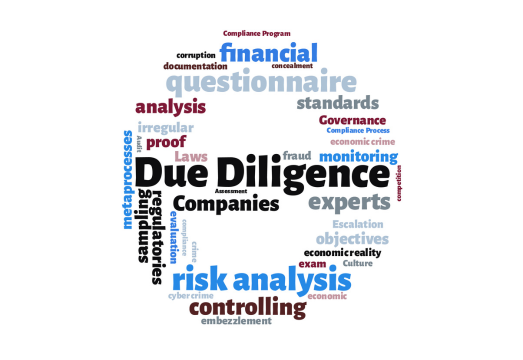In 2023, with $315Bn investments by VCs in tech startups globally, it has become increasingly more imperative to perform more Due Diligence as a prerequisite for the release of investments to startups to ensure the founders are performing as expected and their business have processes in line with global best practices to prevent corporate governance outages.
Due diligence for startups involves a comprehensive investigation into various aspects of the business to assess its viability, risks, and potential for success. Different types of due diligence are conducted to thoroughly evaluate different facets of a startup. Here are some key types of due diligence for startups:

1. Financial Due Diligence:
· Objective: Evaluate the financial health and performance of the startup.
· Focus Areas: Financial statements, cash flow analysis, revenue recognition, debt obligations, and financial projections.
· Documents to Review: Income statements, balance sheets, and cash flow statements for the past several years. Audited financial statements (if available). Detailed financial forecasts, including revenue projections, cost structures, and profitability estimates. Annual budgets and operating plans for the upcoming years. Corporate tax returns for the past few years. Details of outstanding debts, loans, and other liabilities.
2. Legal Due Diligence:
· Objective: Identify legal risks and ensure compliance with laws and regulations.
· Focus Areas: Contracts, intellectual property, regulatory compliance, litigation history, and any legal disputes.
· Documents to Review: Articles of incorporation, bylaws, and organizational charts. Shareholder agreements and any amendments. Customer contracts, supplier agreements, and partnership contracts. Employment contracts and non-disclosure agreements. Patents, trademarks, and copyrights registration documents. Licensing agreements and any legal disputes related to IP. Details of any ongoing or past legal disputes. Settlement agreements and court judgments. Certifications, permits, and licenses. Documentation demonstrating compliance with industry-specific regulations.
3. Operational Due Diligence:
· Objective: Assess the efficiency and effectiveness of the startup’s operations.
· Focus Areas: Processes and workflows, supply chain, technology infrastructure, and key operational risks.
· Documents to Review: Details of the company’s organizational structure and key personnel. Documentation outlining key operational processes and workflows. Details about the technology stack and infrastructure. Cybersecurity measures and policies. Contracts with suppliers and distributors. Details of supply chain management processes.
4. Commercial Due Diligence:
· Objective: Evaluate the market and industry dynamics.
· Focus Areas: Market size, competition analysis, customer segmentation, growth opportunities, and market trends.
· Documents to Review: Studies and reports on market trends and dynamics. Surveys, customer reviews, and feedback mechanisms. Customer acquisition and retention strategies. Reports and analysis on key competitors.

5. Team and Human Resources Due Diligence:
· Objective: Evaluate the capabilities and dynamics of the startup’s team.
· Focus Areas: Key personnel, team structure, employee contracts, and talent acquisition and retention strategies.
· Documents to Review: Resumes and profiles of key personnel. Succession plans and talent development strategies. Employment contracts and agreements. Non-compete and confidentiality agreements. Documentation of employee training programs.
6. Environmental, Social, and Governance (ESG) Due Diligence:
· Objective: Evaluate the startup’s impact on environmental, social, and governance factors.
· Focus Areas: Sustainability practices, social responsibility initiatives, and governance structures.
· Documents to Review: Documentation of sustainability practices and initiatives. Reports on social responsibility programs.
7. Market Due Diligence:
· Objective: Understand the market conditions and potential demand for the startup’s products or services.
· Focus Areas: Market research, customer feedback, and competitor analysis.
· Documents to Review: Studies and reports on market trends and dynamics. Surveys, customer reviews, and feedback mechanisms. Customer acquisition and retention strategies. Reports and analysis on key competitors.
8. Strategic Due Diligence:
· Objective: Assess the alignment of the startup’s strategic plans with market trends and opportunities.
· Focus Areas: Long-term growth strategies, market positioning, and strategic partnerships.
· Documents to Review: Long-term strategic plans and growth strategies. Documentation related to strategic partnerships and alliances. Records of previous fundraising rounds and investor communications.
9. Technical Due Diligence:
· Objective: Assess the technology and IT infrastructure of the startup.
· Focus Areas: Software architecture, cybersecurity measures, data protection policies, and technology-related risks.
10. IP Due Diligence:
· Objective: Verify the strength and validity of the startup’s intellectual property.
· Focus Areas: Patents, trademarks, copyrights, licensing agreements, and potential infringement risks.
11. Customer and Vendor Due Diligence:
· Objective: Assess relationships with customers and vendors.
· Focus Areas: Customer contracts, satisfaction levels, vendor agreements, and dependencies on key customers or suppliers.
12. Regulatory Due Diligence:
· Objective: Ensure compliance with industry-specific regulations.
· Focus Areas: Industry-specific regulations, permits, licenses, and any regulatory challenges.

Watch-Outs
Performing due diligence for startups is a critical process, and there are several watchouts or considerations that stakeholders, including investors and acquirers, should keep in mind to ensure a thorough and effective evaluation. Here are key watchouts when performing due diligence for startups:
1. Incomplete Information:
· Watchout: Startups may not have a long history or may be in the early stages of development, leading to incomplete financial or operational data.
· Mitigation: Work closely with the startup to gather as much relevant information as possible. Use industry benchmarks for comparison when detailed historical data is lacking.
2. Overly Optimistic Projections:
· Watchout: Startups may present overly optimistic financial projections that may not align with market realities.
· Mitigation: Validate assumptions and projections with market research, industry trends, and the startup’s historical performance. Consider a sensitivity analysis to assess the impact of various scenarios.
3. Dependency on Key Individuals:
· Watchout: A startup’s success may be heavily dependent on a few key individuals, and their departure could pose a risk.
· Mitigation: Assess the team’s depth, evaluate succession plans, and consider contractual agreements that bind key personnel to the company.
4. Undisclosed Liabilities:
· Watchout: Startups may have undisclosed liabilities that could impact their financial health.
· Mitigation: Scrutinize financial statements, contracts, and legal documents for any potential liabilities. Consider indemnification clauses to protect against unforeseen liabilities.
5. Regulatory Compliance:
Watchout: Startups, especially in regulated industries, may face compliance challenges.
Mitigation: Conduct regulatory due diligence to ensure compliance with industry-specific regulations. Assess any pending regulatory issues that could affect the startup.
6. Lack of Scalability:
· Watchout: Some startups may struggle to scale their operations or products.
· Mitigation: Evaluate the scalability of the business model, technology infrastructure, and operational processes. Consider potential challenges in meeting increased demand.
7. Unrealistic Valuation:
· Watchout: Startups may have valuations that seem disconnected from their current and projected performance.
· Mitigation: Engage in a thorough valuation analysis, considering industry benchmarks, comparable transactions, and discounted cash flow models.
8. Hidden Debt or Obligations:
· Watchout: Undisclosed debts or obligations can impact the financial stability of the startup.
· Mitigation: Review contracts, financial statements, and other relevant documents for hidden debts. Ensure transparency in financial reporting.
Conducting due diligence with a keen awareness of these watchouts can help mitigate risks and provide a more accurate assessment of a startup’s potential for success. It’s essential to approach due diligence with a combination of skepticism, thorough investigation, and a willingness to address any issues that arise.

Real-Life Examples of Due Diligence Lapses
While due diligence lapses can occur in various contexts, it’s important to note that startups, by their nature, may face unique challenges that can contribute to due diligence oversights. Here are a few examples of due diligence lapses specific to startups:
Theranos (2015):
Theranos, often considered a startup in the health technology sector, claimed to have developed a groundbreaking blood-testing technology. Due diligence lapses occurred among investors, board members, and regulatory bodies that failed to thoroughly scrutinize the company’s claims. The technology’s deficiencies were eventually exposed, leading to significant financial losses for investors.
Zenefits (2016):
Zenefits, a startup providing human resources software, faced compliance issues related to its insurance brokerage services. Due diligence lapses in regulatory compliance and internal controls led to regulatory fines and a management shakeup. Investors and stakeholders were surprised by the extent of the regulatory violations.
WeWork IPO (2019):
WeWork, a high-profile startup in the co-working space, faced scrutiny during its attempt to go public. Investors and analysts raised concerns about the company’s governance, valuation, and unconventional CEO behavior. Due diligence lapses were evident in the initial failure to uncover these issues, leading to the postponement of the IPO.
Quibi (2020):
Quibi, a short-form video streaming startup, raised significant funding but struggled to gain traction in the market. The company’s failure highlighted potential due diligence lapses in assessing market demand, competition, and the viability of its business model. Investors faced substantial losses as a result.
Juicero (2017):
Juicero, a startup that produced a high-tech juicing machine, faced criticism when it was revealed that the machine wasn’t necessary for making the company’s juice packs. Investors may not have thoroughly evaluated the practicality and market need for the product, leading to financial setbacks.

Important Notes
If your company would embark on a due diligence ensure that you take into cognizance the following:
· Confidentiality Agreements: Before sharing sensitive information, parties involved may sign confidentiality agreements to protect the confidentiality of the information exchanged during due diligence.
· Customization: The specific documentation required may vary based on the industry, the startup’s business model, and the objectives of the due diligence. Stakeholders should tailor their document requests accordingly.
· Legal Advice: Engaging legal professionals is crucial to ensure compliance with laws and regulations and to address any legal complexities during the due diligence process.
I hope you found this helpful to better understand what your options are within due diligence and the practical steps on how to bring it to life for your business.





